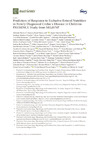Identificador persistente para citar o vincular este elemento:
https://accedacris.ulpgc.es/jspui/handle/10553/106859
| Título: | Predictors of Response to Exclusive Enteral Nutrition in Newly Diagnosed Crohn´s Disease in Children: PRESENCE Study from SEGHNP | Autores/as: | Moriczi, Melinda Pujol-Muncunill, Gemma Martín-Masot, Rafael Jiménez Treviño, Santiago Segarra Cantón, Oscar Ochoa Sangrador, Carlos Peña Quintana, Luis González Santana, Daniel Rodríguez Martínez, Alejandro Rosell Camps, Antonio Armas, Honorio Barrio, Josefa González de Caldas, Rafael Rodríguez Salas, Mónica Balmaseda Serrano, Elena Donat Aliaga, Ester Bodas Pinedo, Andrés Vaquero Sosa, Esther Vecino López, Raquel Solar Boga, Alfonso Moreno Álvarez, Ana Sánchez Sánchez, César Tolín Hernani, Mar Gutiérrez Junquera, Carolina Martinón Torres, Nazareth Leis Trabazo, María Rosaura Eizaguirre, Francisco Javier García Peris, Mónica Medina Benítez, Enrique Fernández Caamaño, Beatriz Vegas Álvarez, Ana María Crespo Valderrábano, Laura Alonso Vicente, Carmen Rubio Santiago, Javier Galera-Martínez, Rafael García-Romero, Ruth Ros Arnal, Ignacio Fernández Cebrián, Santiago Lorenzo Garrido, Helena Viada Bris, Javier Francisco Velasco Rodríguez-Belvis, Marta Bartolomé Porro, Juan Manuel Blanco Rodríguez, Miriam Barros García, Patricia Botija, Gonzalo Chicano Marín, Francisco José La Orden Izquierdo, Enrique Crehuá-Gaudiza, Elena Navas-López, Víctor Manuel Martín-de-Carpi, Javier |
Clasificación UNESCO: | 32 Ciencias médicas 320503 Gastroenterología |
Palabras clave: | Inflammatory bowel disease Crohn’s disease Exclusive enteral nutrition Calprotectin Children, et al. |
Fecha de publicación: | 2020 | Publicación seriada: | Nutrients | Resumen: | Exclusive enteral nutrition (EEN) has been shown to be more effective than corticosteroids in achieving mucosal healing in children with Crohn´s disease (CD) without the adverse effects of these drugs. The aims of this study were to determine the efficacy of EEN in terms of inducing clinical remission in children newly diagnosed with CD, to describe the predictive factors of response to EEN and the need for treatment with biological agents during the first 12 months of the disease. We conducted an observational retrospective multicentre study that included paediatric patients newly diagnosed with CD between 2014–2016 who underwent EEN. Two hundred and twenty-two patients (140 males) from 35 paediatric centres were included, with a mean age at diagnosis of 11.6 ± 2.5 years. The median EEN duration was 8 weeks (IQR 6.6–8.5), and 184 of the patients (83%) achieved clinical remission (weighted paediatric Crohn’s Disease activity index [wPCDAI] < 12.5). Faecal calprotectin (FC) levels (μg/g) decreased significantly after EEN (830 [IQR 500–1800] to 256 [IQR 120–585] p < 0.0001). Patients with wPCDAI ≤ 57.5, FC < 500 μg/g, CRP >15 mg/L and ileal involvement tended to respond better to EEN. EEN administered for 6–8 weeks is effective for inducing clinical remission. Due to the high response rate in our series, EEN should be used as the first-line therapy in luminal paediatric Crohn’s disease regardless of the location of disease and disease activity | URI: | https://accedacris.ulpgc.es/handle/10553/106859 | ISSN: | 2072-6643 | DOI: | 10.3390/nu12041012 | Fuente: | Nutrients [ISSN 2072-6643], v. 12(4) |
| Colección: | Artículos |
Citas de WEB OF SCIENCETM
Citations
19
actualizado el 08-jun-2025
Visitas
132
actualizado el 17-ago-2024
Descargas
85
actualizado el 17-ago-2024
Google ScholarTM
Verifica
Altmetric
Comparte
Exporta metadatos
Los elementos en ULPGC accedaCRIS están protegidos por derechos de autor con todos los derechos reservados, a menos que se indique lo contrario.
